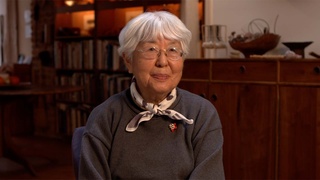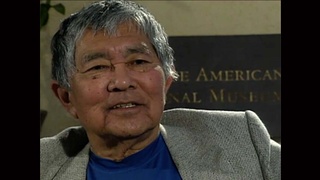Interviews
Relating to Hispanic immigrant families at detention center in Laredo, TX
But this Laredo trip was the closest I felt that I could feel what my mom, my sisters went through. Just hearing their voices in Spanish, there was an interpreter there. They were saying, oh my god, their story is nothing compared to ours. We were, they were detained for six months to a year, we were there for three and a half years, they don't think there's any comparison.
But for them to tell their story in Spanish, I could see my sister in particular, Kiyo is the second oldest now, my oldest sister married right out of camp, so she went to Los Angeles. So my older sister was kind of in charge, and she did a lot. And she only spoke Spanish and Japanese, so her English was this heavy accent, Spanish accent. We always had fun with her because of that. But when I heard the ladies speaking, one lady from Guatemala talked about her four kids, and the oldest was eighteen and her daughter was eighteen, and they took her away. This is now happening today, and she couldn't figure out why, and later they told her, "Well, she's eighteen so she can take care of herself." There's no law that does that. Everything's, they're breaking the law regularly, no different than what they did with us. And when they were telling their story they were breaking down and crying, the interpreter was crying, and it was a moment that I could feel a little bit of what my parents and my sister went through.
I was really torn. That's when I said, oh god, that speaking, hearing the Spanish, you just, right away, I could sense what my sister or my mom went through, because that's all they spoke, or Japanese.
Date: September 20, 2019
Location: California, US
Interviewer: Tom Ikeda and Yoko Nishimura
Contributed by: Watase Media Arts Center, Japanese American National Museum and Denshō: The Japanese American Legacy Project.
Explore More Videos

Father was convinced the constitution would protect him
(b. 1935) Sansei businessman.

General reasons why people left Japan for Peru
Okinawan American whose parents are from Peru.

Working together in Okinawa using three languages
Okinawan American whose parents are from Peru.

The lack of discussion about family’s incarceration in Amache
Sansei judge for the Superior Court of Los Angeles County in California


Her brother’s reasons as a No-No Boy
(b. 1923) Japanese American poet, activist

Her grandfather was pressured to teach Japanese
Sansei judge on the Superior Court of Los Angeles County in California

Neighbor took care of her mother after grandfather was taken by FBI
Sansei judge on the Superior Court of Los Angeles County in California

Immediately after the bombing
(b. 1938) Japanese American. Hiroshima atomic bomb survivor

Other family members not as lucky
(b. 1938) Japanese American. Hiroshima atomic bomb survivor

His parents had little hope that he had survived the atomic bomb
(b. 1938) Japanese American. Hiroshima atomic bomb survivor

His views on nuclear weapons
(b. 1938) Japanese American. Hiroshima atomic bomb survivor

Loss When Leaving for Manzanar
Japanese American animator for Walt Disney and Hanna Barbera (1925-2007)

Forcibly deported to the U.S. from Peru
(b. 1936) Japanese Peruvian incarcerated in Crystal City

Stories of Grandfather at a concentration camp in Fusagasuga
(b.1974) Japanese Colombian who currently resides in the United States
